
Warfare: technology and ethics - a reading list
While the United States continues to carry out drone strikes, and China conducts large-scale cyber and information operations, Ukrainian and Russian soldiers live in trenches, and NATO sends tanks to the Donbas front to force a breakthrough. Has war changed dramatically in recent decades as a result of technological developments? Or will war, with all its far-reaching and gruesome consequences, always remain the same?
This reading list offers an overview of recently published work on the history of war, innovations in strategy and technology, information and cyber war, and the ethical issues surrounding the weapon of the future: the autonomous weapon.
The books on this list are only a small selection of all works on technology and war that can be borrowed at the UBL. Follow the link under the title of the book to request it from the Catalogue, or search by author, title or keyword yourself.

Jeremy Black, Introduction to Global Military History: 1775 to the Present Day
2019
Introduction to Global Military History offers an extensive survey of military history from the late eighteenth century to the present day. It covers key events and campaigns from different regions of the world, highlighting the role of technology, politics, and society in shaping the nature of warfare. The book has been a classic in its field since the first edition was published in 2005. The new edition includes a fully revised chapter on conflicts during the eighteenth century, updated coverage of events post-1990 and increased coverage of non-Western conflicts to provide a truly international account of the varied and changing nature of modern military history.
Covering lesser-known conflicts as well as the familiar wars of history and illustrated throughout with maps, primary source extracts and case studies, it is essential reading for all students of modern military history and international relations.
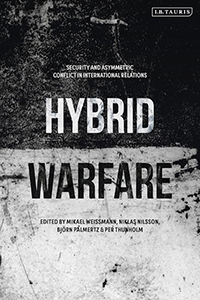
Björn Palmertz et. al., Hybrid Warfare: Security and Asymmetric Conflict in International Relations
2021
Cyber-attacks, fake news campaigns and covertly supported rebel militias have – alongside deployment of conventional troops – become integral parts of international conflicts and warfare. Is it therefore time to speak of Hybrid Warfare? And if so; what does this term mean? Which countries use hybrid warfare tactics, and how can others defend themselves against it?
This edited volume answers these questions through a combination of conceptual reflections and real-world case studies. The introduction and conclusion provide an overview of the development of Hybrid Warface as a conceptual model, its analytical value and limitations. Far more interesting, however, are the case studies that discuss the specific strategies of countries such as Russia, China and Iran, and the responses of actors such as NATO, the EU and the US. Two highly topical chapters analyse how Baltic states and Ukraine responded to Russian attacks and attempts at undermining authorities and institutions.
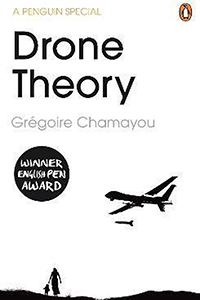
Grégoire Chamayou & Janet Lloyd, Drone Theory
2015
Written in response to the increased use of drones in Pakistan, Grégoire Chamayou's book Drone Theory provides a good introduction to the early days of drone warfare and the socio-political impact it had on the global stage. Chamayou takes the position that the increased use of weaponized drones represents a radical shift in military thinking and how war is waged. The consequences, he argues, are far-reaching. Not only the intended targets are hit, but also the pilots who are miles away at the controls. Drone wars have major philosophical and political consequences for the population 'there' and 'at home'.
Through his discussion of the history of drones, the psychological, ethical, and philosophical implications of using these weapons, and consequent profound political ramifications that have influenced conflicts around the world, Chamayou builds a compelling case against the use of drones in warfare.

Kyle Grayson, Cultural Politics of Targeted Killing: On Drones, Counter-Insurgency, and Violence
2016
In many works, such as the ones found in this list, warfare is discussed within a particular framework, often to do with ethics, morality and legality. Kyle Grayson in Cultural Politics of Targeted Killing: On Drones, Counter-Insurgency, and Violence focuses on these same aspects, but adds the dimension of culture. In doing so he adds a necessary, albeit complex, layer to the debates surrounding the use of drones in conflict areas. After all, as he argues, the act of killing and its justification “is realized by a cultural politics constituted by common values, norms, understandings and modes of interpretation that present it as a required, if not regular, element of security provision”. By using this novel approach, Grayson aims to answer an imporant question: How is it possible that targeted killing has become a feasable option in operations undertaken by liberal regimes, which nominally place such value on human life.
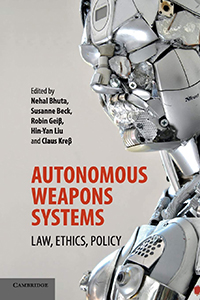
ed. Nihal Bhuta, Autonomous weapons systems: law, ethics, policy
2016
It's one of the greatest challenges of the twenty-first century: how do we respond to the ever-increasing power of computers; to ensure that computers enhance rather than undermine human objectives. For the first time in history, life or death decisions are being made in the absence of human beings, also on the battlefield, making situational awareness a thing to be determined by sensors and data. The use of force by one individual against another has always been an intensely personal affair, and ethical and legal norms have been developed accordingly. Humanity is at a crossroads, knowing that the ethical framework for life-or-death decisions, developed over millennia, could not have foreseen this technological revolution.
This book focusses on the legal and ethical side of the policy that ought to regulate autonomous weapons systems. It prophesizes an as-yet unrealized future, knowing that our contemporary reflections may steer it away from dystopia – or quite the opposite, considering that the lines between forecasting, prediction, speculation, envisioning, and even science fiction are currently blurred. Autonomous Weapons Systems explores the open-ended questions that lie ahead of us; regarding the balance between human judgement to machine autonomy, whilst exploring topics such as dignity and responsibility in the light of modern hi-tech warfare.
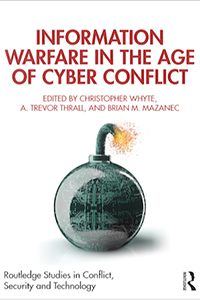
ed. Christopher Whyte, Trevor Thrall, Brian Mazanec, Information Warfare in the Age of Cyber Conflict
2021
In a world competing for every second of attention, information has become a weapon of exceptional power. While cyber conflict revolves around the manipulation of digital systems as part of a limited operation, information warfare has a much broader goal: to weaponize information itself. How have influence campaigns by nation states and power blocs changed in recent years? In what ways are systems like social media used to disseminate information by these actors? And is it possible to protect democratic systems against the influence of anti-democratic parties? These essays, written and coloured by established names in the (inter)national security field in the United States, attempt to answer these questions.
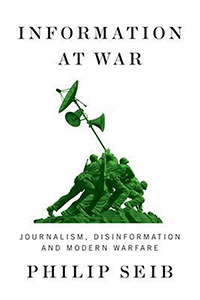
Philip M. Seib, Information at War: Journalism, Disinformation, and Modern Warfare
2021
In this book, Philip Seib hones in on the importance of information in times of war. Organized chronologically, starting from the Second World War on towards the present day, Information at War shows how information can and has been weaponized in order to achieve military objectives. The book gives many concrete examples of situations in which information warfare has taken place; not only within and through larger geopolitical power blocs, but also, for example, in countries on the Russian periphery, such as the Baltic states. An interesting example is that of Finland, which, in an effort to defend itself against Russia, is educating its public extensively about disinformation strategies.
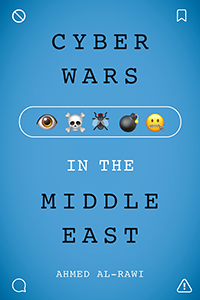
Ahmed Al-Rawi, Cyberwars in the Middle East
2021
Cyberwar in the Middle East by Ahmed Al-Rawi is a highly informative book that provides a detailed analysis of the role of cyber warfare in the complex political and security landscape of the Middle East— an understudied topic. The book offers an in-depth exploration of the motivations and strategies of state and non-state actors involved in cyber warfare in the region.
One of the most impressive aspects of the book is its emphasis on the human dimension of cyber warfare. Al-Rawi provides a nuanced understanding of the individuals and groups involved in cyber attacks, and the ways in which these actors interact with each other and with broader political and social forces.
Overall, Cyberwars in the Middle East is a valuable contribution to cybersecurity studies and essential reading for anyone interested in gaining more knowledge about the complexities and interfaces of technology, politics and conflict in the Middle East. Al-Rawi's text is clear, concise and engaging, making this book accessible to experts and general readers alike.
Contact us
Do you have suggestions for this reading list? Or would you like the UBL to purchase a title on war, ethics or technology that is not yet available in our catalogue? Contact us via Ask a Librarian.
